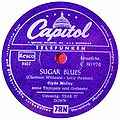Clyde McCoy
Clyde McCoy (born December 29, 1903 in Ashland , Kentucky , † June 1, 1990 in Memphis , Tennessee ) was an American trumpeter and big band leader in the field of swing , popular music and later Dixieland jazz . The first wah-wah device was named after him, the "Vox Clyde McCoy 848".
Live and act
Clyde McCoy comes from the famous McCoy family in Kentucky , best known for the legendary feud with the Hatfield clan . Clyde McCoy grew up in Portsmouth (Ohio) , gained his first musical experience at school and church festivals and played the trombone in a marching band at the age of nine. He eventually switched to the trumpet and played the river steamers at the age of fourteen. He then founded his first formation in Louisville (Kentucky) in 1920 and went to California in 1924. He then became popular across the country with the band he founded in 1928. The recordings made in the 1930s also contributed to this.
McCoy's greatest hit success, which often played with a damper , was the song Sugar Blues , which he played for the first time in 1930 when he was engaged at the Drake Hotel in Chicago and which was successful in numerous versions for decades, such as in McCoy's own recordings in 1931 and 1935 for Columbia , who returned to the Billboard Country (Hillbilly) chart in 1941 ; In 1947, Johnny Mercer had a hit with a sung version. McCoy celebrated further successes with In the Cool of the Night, The Goona Goo, Wah Wah Blues and Smoke Rings .
The wah-wah device named after Clyde McCoy is closely associated with the million-dollar hit "Sugar Blues" ; this "Urwah", which was later manufactured by the Vox company , was then the wah-wah pedal that Jimi Hendrix mainly used. McCoy built his entire career on this wah wah sound effect, which he created with the plunger .
In 1935 McCoy switched to the Decca label ; In 1936, the McCoy Orchestra followed Benny Goodman's successful engagement at New York's Paramount Theater . In addition to McCoy, who played with a normal and a piccolo trumpet, the orchestra consisted of twelve musicians, including: a. Bill Russo and the future band leader Jack Fina . In 1937 the three Bennett Sisters joined as band singers ; one of them, Maxine Means, became McCoy's wife in 1938.
In 1942 McCoy took the music scene by surprise when he joined the US Navy with his entire band . Immediately after the end of the war, he continued to work with his orchestra and was able to expand it to 15 members. In 1955 he dissolved the ensemble and turned to other business; u. a. he ran a nightclub in Denver .
His temporary withdrawal from the music scene ended in 1960 when he built up a Dixieland Jazz septet with which he a. a. appeared in the round table in New York and after the successful engagement went on tours through the USA and Canada. He remained active with this band until the 1970s, performing in clubs and casinos in Las Vegas and Lake Tahoe until the mid-1980s . In the late 1970s, McCoy settled in Memphis, where he mainly worked as a music teacher and only occasionally appeared with Dixieland formations.
Clyde McCoy is remembered by a star on the Hollywood Walk of Fame (6426 Hollywood Blvd.).
Discographic notes
- The Uncollected: Clyde McCoy (Hindsight, 1936)
Web links
swell
- George T. Simon: The Golden Era of Big Bands ("The Big bands"). Hannibal-Verlag, Höfen 2004, ISBN 3-854-45243-8 .
- Leo Walker: The Big Band Almanac . Ward Ritchie Press, Pasadena. 1978
| personal data | |
|---|---|
| SURNAME | McCoy, Clyde |
| BRIEF DESCRIPTION | American trumpeter and big band leader in swing |
| DATE OF BIRTH | December 29, 1903 |
| PLACE OF BIRTH | Ashland, Kentucky |
| DATE OF DEATH | June 1, 1990 |
| Place of death | Memphis , Tennessee |
